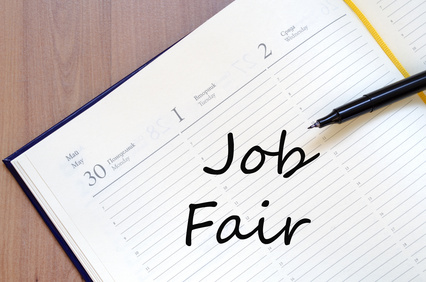Job Fairs are a fantastic opportunity to get face to face with people that work for employers of interest. It’s a great place to conduct some serious networking.
However, it can end up a complete waste of time if you spend your day randomly chatting to everyone and anyone and collecting as many freebies as you can! Shh don’t tell anyone but I have a stationery fetish!! All you’ll end up with is a batch of business cards, pens and key rings!
Here’s a few suggestions to maximize your time when you attend Job Fairs.
Breakfast
The best meal of the day! Start by having a really good breakfast. This will set you up with lots of energy for the morning shift.
If you are planning on staying all day, factor in a proper lunch too. It only needs to be 30 minutes but if you try to work through it will show in your presentation and communication by the middle of the afternoon.
Remember this is your opportunity to make that all important first impression. Don’t underestimate the importance of Job Fairs.
Research & Plan your day
It’s essential you go through the attendance list before the event. Select the most appropriate and most relevant employers to your career aspirations and goals. To be able to do this effectively you’ll need to do a little research first. Pick the top 5 employers to target in the morning when you are likely to be at your best.
It’s better to have time left over to spend meeting other companies than run out of time and energy before meeting your preferred employers.
If you are planning on making a day of it, it’s likely you’ll get very tired and drained by the end of the afternoon. That’s why it’s important to talk to the most relevant employers in the morning when you’re still fresh.
Prepare your elevator pitch
It’s a given at an event of this nature that the people on the stands will ask you what you do to start a conversation. Make sure you have really honed that 30 to 60 second pitch. Again it’s likely the people you’ll be talking to will understand what you do but be prepare to make it crystal clear.
The people on the stands may not be decision makers or even senior managers of the organisation. There’ll be no way of knowing who you will meet on the day. What is certain you’ll want to make a good first impression and make really good use of your time.
Ask Questions
It’s your career and it’s important you make the right decisions for you and if relevant your family too. So make the most of this great networking opportunity to ask important questions.
- Career progression, training and development opportunities
- Travel commitments or opportunities to work overseas
- Corporate culture and what type of people are successful in the organisation
- What’s involved in the recruitment process
Take your CV and business cards
These days it’s likely they will ask you to send your CV by email. However, it’s always worth taking a few printed copies of your CV for someone to have a look over on the day. Particularly if you are meeting a decision maker and you won’t know that until the day.
Make sure you’ve printed on quality paper with a watermark (ensure the watermark is printed the right way up!) and use a folder to keep them neat.
Take a note book with you to the event. When you take someone’s business card make a note about what you have agreed i.e. send CV by email, give a follow up call on a specific date or arrange a meeting, tour etc.
If you’re planning on staying all day you’ll forget what you agreed and this isn’t a good start to building the relationship. Don’t write on the business card or certainly not when they are watching – some people consider this rude or just sloppy.
Follow up
When you have finished the conversation and you feel this is a good lead – factor in the follow up. Ask if it’s okay to give them a call in a week (or whatever is appropriate given how the conversation has gone).
Job fairs are really good opportunities to start building relationships and network with relevant employers. It can be a very tiring and exhausting day so set yourself up with a little advanced planning.


Recent Comments